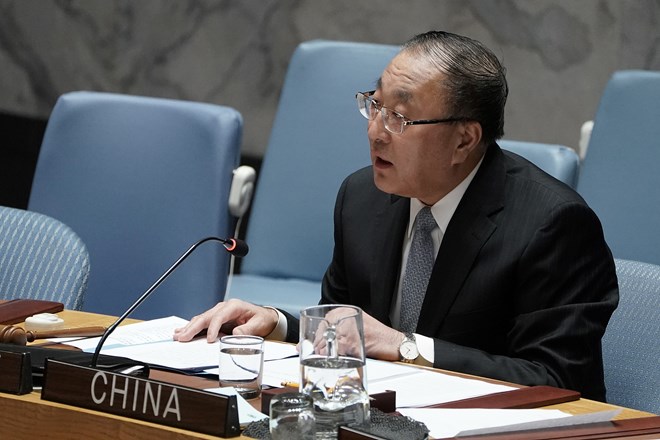
Friday September 15, 2023

A Chinese envoy on Thursday called for the lifting of illegal unilateral sanctions so as to improve international humanitarian work.
It is worth noting that illegal unilateral sanctions severely affect the ability of the public sector of the countries concerned to provide basic services such as education and food supply, and interfere with the private sector's regular activities in trade, investment, and business operation, and as such have become the biggest obstacle to public-private humanitarian cooperation, said Zhang Jun, China's permanent representative to the United Nations.
"The international community should jointly urge relevant countries to immediately lift unilateral sanctions, eliminate their negative effects, and create favorable conditions for international humanitarian actions," he told a Security Council open debate on advancing public-private humanitarian partnership.
The humanitarian cause, as a common endeavor of all humankind, can build the greatest consensus across different civilizations. The international community should practice true multilateralism, promote international humanitarianism, unite all actors, including the public and private sectors and civil society, step up investment, jointly tackle challenges, and continuously improve the humanitarian situation in relevant countries and regions, he said.
Zhang stressed the need to keep up the humanitarian investment.
The current global humanitarian landscape faces unprecedented difficulties and challenges. For a long time, multinational corporations have benefited immensely from the resources and markets of developing countries and thus bear the responsibility to help relevant countries out of their humanitarian predicament and make greater contributions to their people's livelihood and well-being, he said.
At the same time, official assistance from developed countries is the main channel for international humanitarian financing. Their financial commitments should be fulfilled on time and in full. The participation of the private sector should not lead to governments cutting their investment or shifting their responsibilities, he said.
It is worth noting that in some conflict-affected regions and countries, humanitarian funding is being arbitrarily cut back, exacerbating the humanitarian plight of the local populations, which should not happen, he added.
Zhang called for adherence to the fundamental humanitarian principles.
Humanitarian actions should adhere to the principles of humanity, neutrality, impartiality, and independence, and respect the sovereignty, laws, and customs of recipient countries. Public and private institutions, despite their different natures, should both stick to the principle of non-interference in internal affairs when providing international humanitarian assistance, and should not attach any political strings to aid or impose their will on others, let alone seek ulterior political interests in this process, he said.
A few countries, under the pretext of democracy and human rights, have all too easily cut or even suspended humanitarian assistance to Afghanistan and other countries. Such actions will only victimize innocent civilians, worsen the socio-economic crisis, and contravene the spirit of humanitarianism, he said.
Zhang also stressed the need to establish efficient partnerships on an equal footing.
Ultimately, humanitarian assistance is to benefit the recipient country, with its effectiveness and success to be measured by how well it is received among the population in the recipient country. Humanitarian agencies, in determining priorities, modalities, and projects, should not only communicate with key donors, but also heed the views of recipient countries and various local actors. The private sector, in its participation in humanitarian actions, should make use of its comparative advantages and be more relevant to the actual needs of the countries concerned. It has been proven that by effectively increasing the voice and representation of recipient countries, humanitarian actions will be delivered in a more efficient and targeted manner with final results that will better stand the test of time, he said.
For some time, international humanitarian assistance has been overly focused on certain countries while humanitarian assistance for the Democratic Republic of the Congo, Somalia, Haiti, South Sudan, and the Sahel region are severely underfunded. The situation should not go on, he said.
Zhang said there is a need to promote humanitarianism and development in an integrated manner.
Humanitarian crises in some countries are rooted, among other factors, in deteriorating economic situation, climate change, and energy and food challenges, all bogged down to development in the final analysis. The key to fundamentally reducing humanitarian needs and weaning countries off dependence on humanitarian assistance lies in people-centered development, he said.
"China is of the view that we must look beyond traditional means of humanitarian assistance and attach greater importance to the path of economic development. We must go further than short-term help and seek long-term fundamental solutions. We must rise above external blood transfusion and enhance the organic blood generation capacity," he said.
Humanitarian action should be effectively dovetailed with the development strategies of the countries concerned with greater investment in infrastructure, industrial and agricultural development, education and training, among others. The private sector has a unique role to play in promoting trade, investment, and financing cooperation and job creation, thus aligning humanitarian assistance more closely with sustainable development, he added.
China stands ready, together with the international community, to continue to actively participate in multilateral and bilateral humanitarian relief operations and continue to provide support and assistance within its capacity to countries in need, said Zhang.